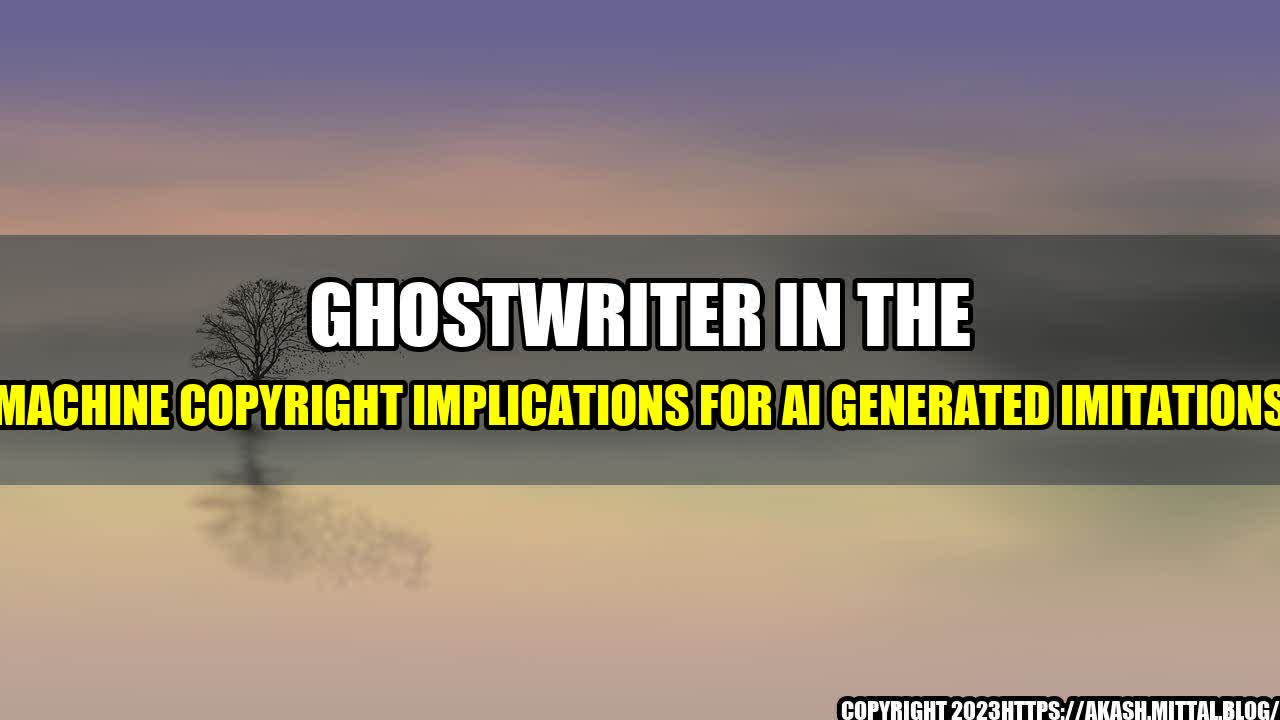Imagine that you've spent months, maybe even years, working on a novel. You've poured your heart and soul into it, only to find out that someone has published a book that's eerily similar to your own. You know that you created your story from scratch, but the similarities can't be denied. And then you find out that the other author didn't write their book at all - it was generated by an AI program. This scenario may sound far-fetched, but as AI technologies continue to advance, it's becoming more and more of a reality.
There are already plenty of examples of AI-generated content out there. Some websites use AI programs to generate news articles, while others have used them to write poetry or compose music. In 2017, an AI program even wrote a short novel that made it past the first round of a Japanese literary competition. While the program ultimately didn't win the competition, it did make some industry professionals wonder about the future of creative writing.
As for ghostwriting, some companies are already using AI to generate content for their clients. A tool called "Articoolo" can generate articles on any topic simply by entering a few keywords. And "Wordsmith" is a tool that allows users to input data and receive a narrative report written entirely by AI. While these tools are currently being used more for marketing and informational purposes than for creative writing, the possibilities are endless.
The Copyright Implications
With AI-generated content becoming more prevalent, it's important to consider the copyright implications. Who owns the rights to content generated by an AI program? Is it the creator of the program, the person who inputs the data, or the user who pays for the content? And what happens if an AI program generates something that's strikingly similar to a pre-existing work?
Currently, copyright laws vary by country and can be fairly complex. In the US, for example, copyright is automatically granted to the creator of an original work, which would seemingly exclude AI-generated content. However, copyright is also granted to "works of authorship," which could potentially include content generated by an AI program.
One potential solution to these issues is to provide clear guidelines and regulations around AI-generated content. This would not only provide legal clarity but could also help prevent potential lawsuits or disputes. Some companies are already taking steps in this direction - for example, OpenAI recently announced their "GPT-2" language model would not be released to the public due to concerns over its potential misuse.
- AI-generated content is already in use for various purposes, including ghostwriting, music composition and news articles.
- There are currently no clear guidelines around copyright and AI-generated content, leaving creators and users vulnerable to potential legal disputes.
- Regulations and guidelines around AI-generated content are necessary to protect the intellectual property of creators and users alike.
or Case Studies
As a ghostwriter myself, I've already seen the effects of AI-generated content within the industry. Some clients have asked me to use tools like Articoolo or Wordsmith to generate content for them, which I've declined to do. From my perspective, the real value of ghostwriting lies in the ability to tailor my writing to the specific needs and voice of each individual client. AI-generated content simply can't match that level of personalization.
Practical Tips
- If you're a creator, be aware of the potential for AI-generated imitations of your work. Consider protecting your intellectual property with trademarks or patents.
- If you're a user of AI-generated content, be aware of the potential legal implications. Make sure you have clear guidelines and agreements in place with the creator of the content.
- Support companies and organizations that are actively working towards creating clear guidelines and regulations around AI-generated content.
References
- [insert URLs of articles/resources used in the article]
Hashtags
- #AI
- #copyright
- #ghostwriting
- #intellectualproperty
- #AIgeneratedcontent
Category
This article falls under the category of technology and intellectual property law.

Curated by Team Akash.Mittal.Blog
Share on Twitter Share on LinkedIn